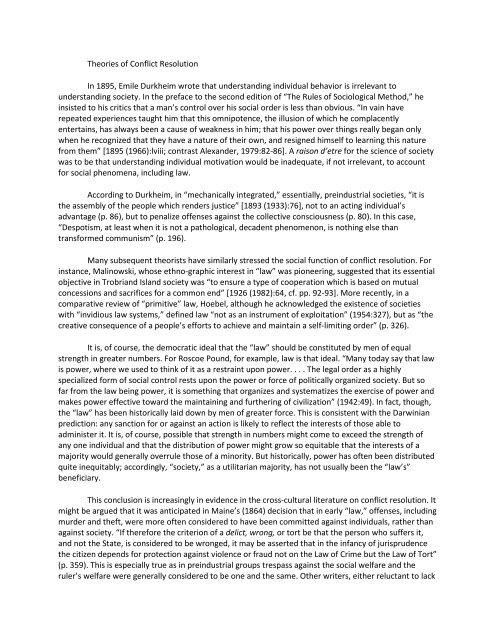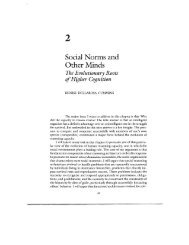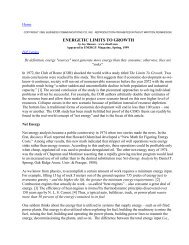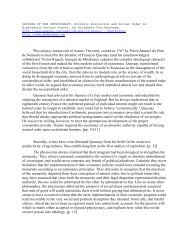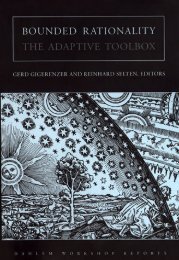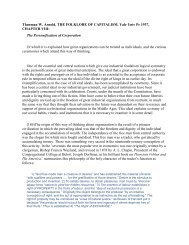DESPOTISM AND DIFFERENTIAL REPRODUCTION: A Darwinnian ...
DESPOTISM AND DIFFERENTIAL REPRODUCTION: A Darwinnian ...
DESPOTISM AND DIFFERENTIAL REPRODUCTION: A Darwinnian ...
Create successful ePaper yourself
Turn your PDF publications into a flip-book with our unique Google optimized e-Paper software.
Theories of Conflict Resolution<br />
In 1895, Emile Durkheim wrote that understanding individual behavior is irrelevant to<br />
understanding society. In the preface to the second edition of “The Rules of Sociological Method,” he<br />
insisted to his critics that a man’s control over his social order is less than obvious. “In vain have<br />
repeated experiences taught him that this omnipotence, the illusion of which he complacently<br />
entertains, has always been a cause of weakness in him; that his power over things really began only<br />
when he recognized that they have a nature of their own, and resigned himself to learning this nature<br />
from them” [1895 (1966):lviii; contrast Alexander, 1979:82-86]. A raison d’etre for the science of society<br />
was to be that understanding individual motivation would be inadequate, if not irrelevant, to account<br />
for social phenomena, including law.<br />
According to Durkheim, in “mechanically integrated,” essentially, preindustrial societies, “it is<br />
the assembly of the people which renders justice” [1893 (1933):76], not to an acting individual’s<br />
advantage (p. 86), but to penalize offenses against the collective consciousness (p. 80). In this case,<br />
“Despotism, at least when it is not a pathological, decadent phenomenon, is nothing else than<br />
transformed communism” (p. 196).<br />
Many subsequent theorists have similarly stressed the social function of conflict resolution. For<br />
instance, Malinowski, whose ethno-graphic interest in “law” was pioneering, suggested that its essential<br />
objective in Trobriand Island society was “to ensure a type of cooperation which is based on mutual<br />
concessions and sacrifices for a common end” [1926 (1982):64, cf. pp. 92-93]. More recently, in a<br />
comparative review of “primitive” law, Hoebel, although he acknowledged the existence of societies<br />
with “invidious law systems,” defined law “not as an instrument of exploitation” (1954:327), but as “the<br />
creative consequence of a people’s efforts to achieve and maintain a self-limiting order” (p. 326).<br />
It is, of course, the democratic ideal that the “law” should be constituted by men of equal<br />
strength in greater numbers. For Roscoe Pound, for example, law is that ideal. “Many today say that law<br />
is power, where we used to think of it as a restraint upon power. . . . The legal order as a highly<br />
specialized form of social control rests upon the power or force of politically organized society. But so<br />
far from the law being power, it is something that organizes and systematizes the exercise of power and<br />
makes power effective toward the maintaining and furthering of civilization” (1942:49). In fact, though,<br />
the “law” has been historically laid down by men of greater force. This is consistent with the Darwinian<br />
prediction: any sanction for or against an action is likely to reflect the interests of those able to<br />
administer it. It is, of course, possible that strength in numbers might come to exceed the strength of<br />
any one individual and that the distribution of power might grow so equitable that the interests of a<br />
majority would generally overrule those of a minority. But historically, power has often been distributed<br />
quite inequitably; accordingly, “society,” as a utilitarian majority, has not usually been the “law’s”<br />
beneficiary.<br />
This conclusion is increasingly in evidence in the cross-cultural literature on conflict resolution. It<br />
might be argued that it was anticipated in Maine’s (1864) decision that in early “law,” offenses, including<br />
murder and theft, were more often considered to have been committed against individuals, rather than<br />
against society. “If therefore the criterion of a delict, wrong, or tort be that the person who suffers it,<br />
and not the State, is considered to be wronged, it may be asserted that in the infancy of jurisprudence<br />
the citizen depends for protection against violence or fraud not on the Law of Crime but the Law of Tort”<br />
(p. 359). This is especially true as in preindustrial groups trespass against the social welfare and the<br />
ruler’s welfare were generally considered to be one and the same. Other writers, either reluctant to lack


